During a widely acknowledged affordable housing crisis, one would normally imagine that affordable housing would be doing very well. While some segments may be performing well, perhaps the most proven form of U.S. affordable housing ever is struggling at historically low levels. How is that possible?
Furthermore, millions of Americans who live in this most proven form of affordable housing are facing challenges and hurdles that they didn’t imagine when they first moved into their dwellings. Why is that so?
This report will explore those issues and others in a step-by-step fashion. We will reference facts, evidence, third-party data, present statements from those with knowledge, and will ‘follow the money’ in a manner that investigators of all kinds have done for decades.
Some of this will be familiar to long-time readers of MHLivingNews and/or our professional sister site. But there will be new information provided in this report too. That new information will shed new light and additional understanding on an issue that arguably harms thousand of independent businesses, untold numbers of investors who are ethically seeking a reasonable rate of return, plus millions who are or could be benefiting from the potential that affordable quality living promises.
We routinely caution readers on four points.
- Don’t skim, because if you do, you may miss a key point that can change the meaning of what you are reading.
- Second, we will cite sources that some may find distasteful for a variety of reasons. There are times we cite a source to highlight the accuracy of that specific statement, even if we may disagree with many other things that same source has said or done. We also at times quote a party to reveal just how hypocritical or self-contradictory that same source is. Rephrased, one must apply the ancient principle of separating the wheat from the chaff to this topic.
- Third, our own understanding of some of these concerns have frankly evolved. One can only report what they know at a given moment in time. If something looks at times a bit different in how we present it now vs. 5 years ago, consider the evolution of understanding.
- Fourth, some of the very same people and operations that we will critique have at times praised us publicly, in writing, on camera, etc. For example, this writer was a board member of the Manufactured Housing Institute (MHI). They were also praise from former clients of our firm, such as Clayton Homes and 21st Mortgage Corporation. While they were still clients, our questions and their responses plus other evidence led us to doubt elements of what they previously stated. To say that we parted ways is to be polite about it. That’s expressed because a) it is brief but accurate summary, and b) so that some who’ve read older articles might understand that evolution in understanding. We’ve always been and remain pro-manufactured homes. That said, we are not in favor of several business practices that are either unethical and/or potentially illegal. As documents, patterns of behavior and other evidence of those concerns mounted, we’ve so reported.
That is to shine alight on what’s going wrong among ‘important’ and ‘connected’ players in the manufactured home industry that this report is being presented. In doing so, we hope to alert manufactured homeowners, public officials, and advocates of all types. We also hope to alert investors who may find that companies they are invested in are behaving in reportedly problematic ways. In doing so, those investors with a conscience or who are risk-averse to the possible implications in what follows could be encouraged to seek options that could yield more ethical, still profitable, and create outcomes more beneficial to others. One can do good and still earn a fine return, although that would be a different topic for a different time.
With that preface, let’s begin.
Making the Case, Step-by-Step
You don’t have to be an attorney to know that cases presented to a judge and/or a jury are made by putting evidence together in a systematic fashion. The prosecutor or plaintiffs’ attorneys lay out the evidence like they were pieces of a puzzle. In making the case, questions like the following should be considered.
- Do the pieces of the puzzle fit?
- Does the evidence make sense to those to whom the information is being presented?
- Is there evidence of wrongdoing and of intent?
- Are there ethical options that could avoid the problems being described?
Imagine for the next several minutes some crime drama you’ve read, watched on TV, or on your smart device. Truth can be stranger than fiction. Factual insights, third-party evidence, money trails, and some common sense that follows will illustrate how that maxim of ‘truth can be stranger than fiction’ applies to manufactured homes in a way that impacts millions of lives.
Let the proceedings begin.
Here on MHLivingNews, we have repeatedly documented using third-party sources that manufactured housing is perhaps the most studied and proven form of affordable housing. We’ve noted, for example, that manufactured housing has been studied by Democratic and Republican lawmakers, who together concluded how important they are for the growing affordable housing crisis.
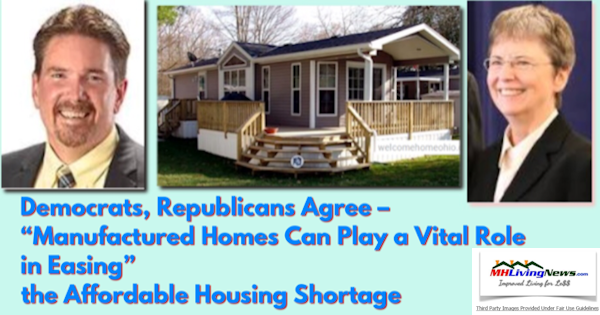
There is nothing else quite like it today. Who says?
Certified Business Economist Scholastica ‘Gay’ Cororaton, who works for the National Association of Realtors, did a deep dive into manufactured housing in 2018. In her published findings, she reported that manufactured homeowners could enjoy appreciation, noting that increasing property value was most common with manufactured homes on privately owned land. Cororaton also said that manufactured homes were routinely less costly than rent. Interestingly, she also noted that manufactured homes were far safer than most people believe.


Many of the text/images rectangular boxes above and herein are hot links to other published reports. They should be part of the understanding of this case of a manipulation of
- information,
- credit/capital,
- the marketplace,
- and the enforcement various laws,
in a manner that seems to benefit a few inter-connected players. Those concerns have not escaped the notice of lawmakers, which will noted further below. While some of this has been covered by mainstream media, in fairness, they are not specialists. For reasons that will become clearer, mainstream media that shined a partial light on these topics should be excused to a certain extent for not revealing the entire picture. Why?
Briefly, it is what computer programmers have long referred to as “GIGO.” Garbage in, Garbage out. If mainstream media turned to tainted sources for information, what is to be expected except information that to some degree is likewise tainted?
Again, in fairness to mainstream media, if I as a 25+ year award-winning veteran of the manufactured home industry professional took years to fully grasp these issues, how can someone expect a journalist with a few hours or a few days of research to get it all accurately before moving on to their next topic?
The same point must be made with respect to lawmakers, their staffs, and some ethical nonprofit advocates who may be well intended. They too only have a limited amount of time to grasp an issue, issue a report, and move onto their next assignment or challenge. That time crunch is important to understand, because it helps explain why several will simply turn to the national trade association, ask a few questions, get some other viewpoints, and then move on.
It is a serious issue that doesn’t get the necessary attention to grasp the nuances.
For example. We’ve noted on MHLivingNews that there are decades of third-party research, by nonprofits, universities, engineers, and public officials that have routinely found that manufactured homes defy the image that has often been falsely portrayed against the homes and their homeowners. The link below presents the single largest such collection online at the time it was published. We are unaware of a more comprehensive compilation of such research at this time. That said, there are more such research reports that could have been added, so this listing found via the link below should not be thought of as the only ones that make the important points that they presented.

Rephrased, the ‘evidence’ or proof that supports manufactured housing is impressive. That said, why is the industry still so misunderstood?
We have noted with words, videos, illustrations, and infographic that manufactured homes and their owners ought to be better respected, appreciated, and indeed they should be celebrated.
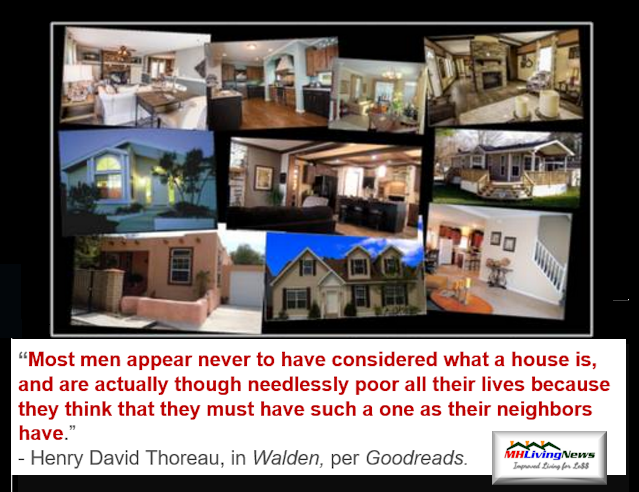

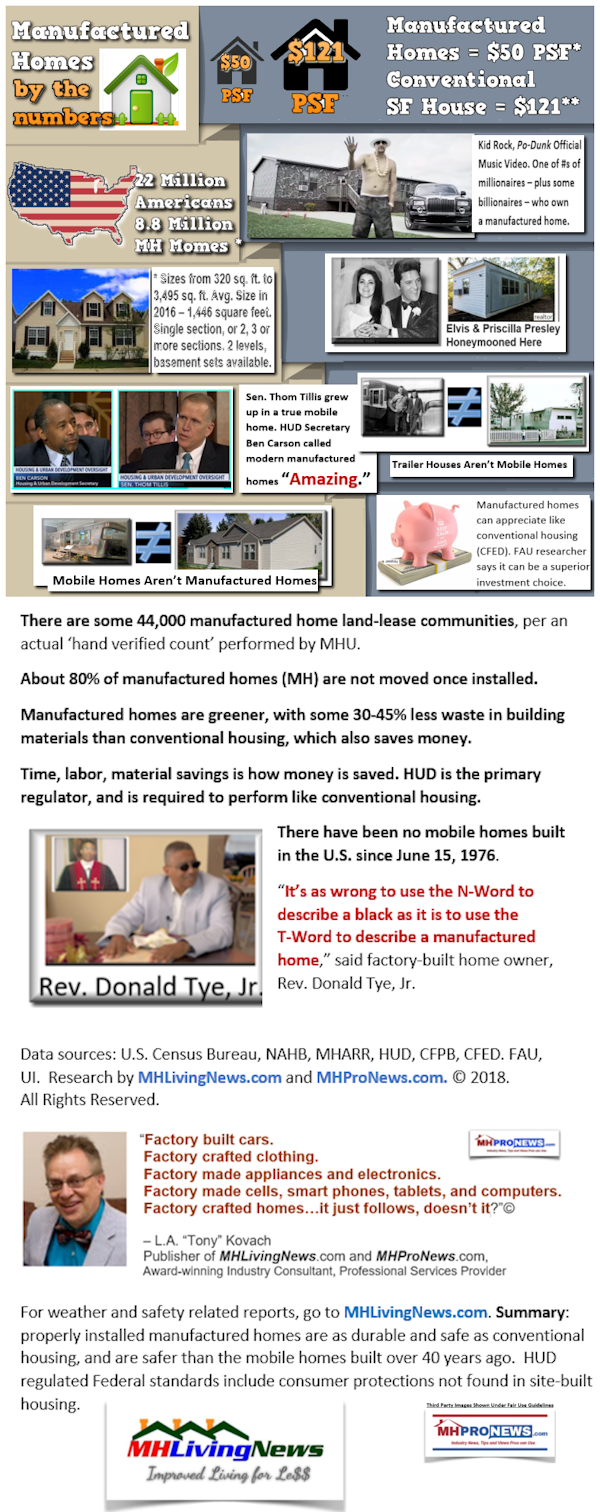
We have also noted that many of these facts that are hiding in plain sight have for whatever reason not been properly promoted by the Manufactured Housing Institute (MHI). Who says? Prominent MHI member company leaders, with but one of several examples shown below.

The evidence for manufactured housing, such as what is noted herein, may get mentioned to MHI members via email or in documents found behind password-protected logins. But that in itself begs the question. Why hide good information about your industry behind a firewall? If as a trade association you are sincerely trying to improve and grow your industry, why not make that information as widely available to the public as possible?
Those obvious questions have been put to MHI and their ‘big boy’ leaders several times directly and through our published reports. For years they responded promptly. Starting about 2½ years ago, they stopped making direct, on the record replies. Why? Were the questions too uncomfortable for those being asked?
Some strong evidence like the items noted above and linked from herein, are not to be found easily or at all on the MHI website. One might wonder, how is that possible? After all, MHI has a full-time public relations person, and has had one for some years. MHI also has staff that engage from time to time with mainstream media. Why are some of the best arguments for the industry missed by the professional association that is supposed to be promoting the manufactured housing industry?
Hold that thought, and with that in mind, carefully pursue what former MHI President Chris Stinebert had to say in what is linked below. It is the full departing message from MHI’s former president to the industry. Especially note Stinebert’s strong close in his parting letter to the industry. That closing point was to take care that the interests of manufactured homeowners be carefully protected. On that point, we editorially concur.

But look more carefully, and what Stinebert’s message reads like is a polite slap in the face to his own former association. In that, he would not be alone. We are in contact with several former MHI team members, some of whom may express similar concerns that Stinebert did. Others, due perhaps to NDA’s – non-disclosure agreements – they’ve reportedly signed with MHI may stay silent on issues, lest they be subject to a suit.
What is already coming into focus is the image of an industry that has a great story, but that story is not being properly told by those who are supposed to be the free market agents of the industry.
Using that puzzle analogy, you can see the frame and some parts of the picture, which leads us to wonder, what’s next?
Now ponder the notion that during an affordable housing crisis, for 11 of the past 12 months, manufactured housing has been in a sales slump. See the data reported by the MHI rival trade group, the Manufactured Housing Association for Regulatory Reform (MHARR).
MHARR has long advocated for independent communities and retailers to form a new ‘post-production’ trade group, because MHI is not doing that part of their job properly.

On that, Neal Haney, two state trade groups, and numbers of manufactured home land-lease communities broke ranks with MHI, siting MHI’s years of failed promises.
That’s not to necessarily endorse the new communities’ group, as we have called into question some of their decision since the fledgling group has begun. But it is to note that concerns about performance issues by MHI are not uncommon. Using the principle of separating wheat from chaff, one can look at what Haney and his colleagues raised as concerns and apply them to the issues addressed herein.
MHI Incompetence, or Market Manipulation?
We have previously reported on ways that the market has been arguably manipulated. One must wonder, are there conflicts of interest and corruption at work at MHI? The report below is one of several we have published that examines that issue.
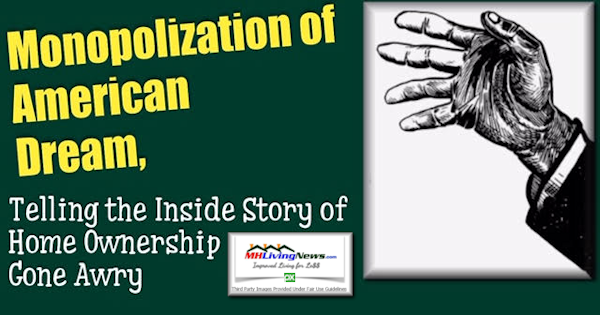
Here is another.

The prime, but not the only, example of market manipulation that harms consumers is the Warren Buffett led Berkshire Hathaway roughly 15-year conquest of the manufactured housing industry.
Buffett is one of the richest men on the planet. The Berkshire Hathaway conglomerate has tentacles that connect it via stocks and/or board memberships or other means to tech giants like Amazon, Apple, and Microsoft. Berkshire has interests in several major lenders and financial service firms, like Wells Fargo. For years, 21st, VMF and Wells Fargo have been the three biggest lenders in manufactured housing.
Democratic lawmakers have raised concerns for some years about lending practices of Berkshire Hathaway finance companies that support Clayton Homes, independents, or others involved in manufactured homes.
Additionally, it has been documented in reports like those linked here and here that Buffett has through millions of dollars in donations – when the dark money trail is followed – influenced directly and/or indirectly nonprofits that in turn impact manufactured housing. These impacts – properly understood – are often unfavorable. Is unfavorable media created to pose an additional obstacle that is easier for a larger firm to navigate than a smaller one is able to do?
One must keep in mind that Buffett and his managers are taught to think long term. Kevin Clayton has stated that Buffett told him and other Berkshire managers that he is willing to lose money for several years, so long as the Moat for one of his brands is growing.

Ponder that for a few moments. If they are willing to lose money to expand their market share, then doesn’t it logically follow that if they are making money while depressing the industry and growing market share that it fits his business principles?
Why These Vexing Issues Matter to Millions of Manufactured Homeowners, and Others
These issues matter to manufactured homeowners, particularly manufactured home community residents. Why? Because limiting competitors creates fewer consumer choices. In the community realm, that means rising site prices because there are not enough competitors to keep prices in line. That’s among the reasons why MHLivingNews previously spotlighted and debunked the problematic argument made by Frank Rolfe, who encourages others never to build new communities. If that occurred, what would happen? Given a normal economy, based upon the law of supply and demand, prices on existing properties would continue to rise unchecked. That in turn would guarantee that some would experience the kind of severe spikes like Havenpark and others are pushing onto residents of communities that they own.

MHI used to cite – prior to the 2003 Buffett/Berkshire acquisition of Clayton Homes and their affiliated lenders – the work of then Harvard Joint Center on Housing Studies expert Eric Belsky. Belsky predicted manufactured housing’s future dominance in the housing marketplace. But Belskey missed the timeline of his projection. Why? Perhaps because of another noteworthy Belsky point. The two quotes are placed in tandem by this writer to make the points that follow.
In the report linked here and below, MHLivingNews laid out documents, direct quotes in context by Warren Buffett in his annual Berkshire Hathaway letter to shareholders, and a video interview of Kevin Clayton with Clayton Homes. When properly understood, that report paints the picture of how they deployed tactics known as “the Moat.” As part of their ‘moat,’ the Berkshire brands, which Buffett says are supposed to function as independent units, limited financing to competitors. That seems like a clear example of marketplace manipulation.

In the wake of the housing and financial crisis of 2008, the excuse made in the letter by Tim Williams, the president and CEO of 21st, sounded plausible. But it was arguably a ruse that Buffett and Clayton both contradicted not long after Williams’ letter was sent out via the U.S. Mail and “the wires.” Those points are noteworthy for purposes of a possible RICO case. Also important in RICO can be fraud, which is defined as a deception designed to separate one or more people of something of value to them.
That tactic caused numbers of often long established and successful HUD Code manufactured home builders to fail. Perhaps as or more important, thousands of independent manufactured home retailers failed. Each of those failures has a consumer and public interstate impact. The article above or linked here is thus a possible blueprint for an antitrust case against billionaire Buffett, Berkshire, Clayton Homes, 21st Mortgage Corporation, and any in de facto league with them.
Having presented such evidence to the Manufactured Housing Institute (MHI) – which claims to represent the interests of all segments of factory-built housing – what did they do? Apparently, nothing to Clayton or 21st, but they did hire an outside attorney – John Greiner at Graydon Law – to in our view wrongfully threaten us for calling into question some claims made by MHI and those companies that are behind them. More on MHI further below, but for now, keep in mind that this writer replied to Greiner’s threat by pointing to the facts and the law. For the most part, since some correspondence involving Greiner and myself, he and Graydon Law have gone mute.
A source pointed us to a column written by Michelle Smith, former president of the Golden State Manufactured-Homeowners League (GSMOL), from which we learned that the Tides nonprofit was supporting the MHAction nonprofit. We did added research, she was correct but we also find out – who provides the money that funds the Tides? For several years, the top donor has been a nonprofit foundation funded entirely by Warren Buffett. See that linked her or by clicking the text image box below.

MHLivingNews and our MHProNews professionally focused sister site are not the only media outlets that have directly or indirectly called out Buffett, Berkshire, Clayton Homes, and their affiliated lenders – notably 21st Mortgage and Vanderbilt Mortgage and Finance (VMF) – for a pattern of behavior that is arguably monopolistic. Monopolization, as those who recall their Americans History know, can harm small businesses, but it hurts workers and the broader population of people too. That is why antitrust laws were created in the first place. To stop or punish monopolistic practices.
Tim Anderson, past president of the National Manufactured Home Owners Association (NMHOA), hit the nail close to the head when he said that leasing a site in a manufactured home community was affordable for years. But during those years, Anderson aptly noted, new communities were being built. There was sufficient new supply coming online to keep prices in natural check.
That’s part of what must happen, more new communities need to be opened. More home sites for manufactured homes need to be made available.
But for perhaps 2 decades, fewer new communities have opened, and far more have closed than opened.
That in turn – based upon economics 101 – means that existing communities might witness a steeper rise in site fees or “lot rent.” Supply and demand are further skewed because as Anderson noted, manufactured homes are not mobile homes. A manufactured home cost thousands of dollars to relocate. So, for an economically marginal homeowner of a manufactured home, they are ‘trapped’ in their community. It’s a point that community owner Frank Rolfe has infamously made, in videos and statements to media too. Let’s note that showing this video should in no way be construed as an endorsement of Rolfe or their operation, but rather documents the point that he and other community owners are well aware of the high cost of moving. If anything, the figure Rolfe cited at the time is often too low.
Marty Lavin, J.D., previously owned manufactured home communities. He has decried in published articles and comments some of the problematic business practices found in manufactured housing.
Lavin as an attorney admitted that he has not deeply studied the issue, but that in his mind there is a case to be made that community residents have an implicit covenant by the property owner to maintain a manufactured home land-lease community and perform certain functions properly.
Lavin has at times been a fierce critic of some industry practices. He has told MHProNews on the record that in his view, the association – meaning MHI – exists to do the bidding of what he called the “big boys.” One could consider that coded language for Buffett, Berkshire, Clayton, their lenders and those in league with them.
It is MHI member firms and operations connected to them that seem to be a common dominator in numerous problematic business practices, such as the one linked below. The company is an MHI member.
Lavin has advised at times financial service firms, including one of the Government Sponsored Enterprises (GSEs). He and his wife Pat/Eva ran a successful financial services company. He has been critical of bad lending by certain industry companies, some of them are now defunct. As an observer of the industry he did well in, he has observed that there are misleading statements made by some. In response to those, he says the following.
The reason those quotes are worth noting is that MHI and their National Community Council, after months of steady public pressure from this platform and our professional sister-site, published last summer with the cover message found here a claim to ask their members to follow a code of ethical conduct. If so, then why are companies like Clayton Homes, Havenpark Capital, or others we’ve reported on at the link here allowed to stay in their trade association? Think what you want, after years of evidence, it looks from our vantage point like an example of what Lavin said. Namely, MHI leaders are saying one thing, wink and a nod, and then go about doing something or allowing something quite different than their ‘official’ statement.
MHI is also reacting to our reports by using their member/surrogates to by publishing information that at a glance they may hope will lead some to think that all is well in manufactured housing. MHProNews has noted that the industry has been in a downturn during an affordable housing crisis. Year over year there is a reduction in new home shipments for 11 of the last 12 months.
They published in conjunction with MHInsider, the infographic below. The importance of this will be explained briefly, but some of the points are noted on their image. Lets begin by noting it is a mix of accurate, but misleading, information.


MHLivingNews Analysis – What Does It All Mean?
- There are several sources that provide reasons to believe that many manufactured home communities are at or are approaching capacity.
- That in turn – based upon the law of supply and demand and basic economics – will likely mean that as properties get sold, site fees will likely rise significantly.
- There are several reasons to believe that the kind of issues that caused Last Week Tonight with John Oliver – or Senator Elizabeth Warren to write specific MHI member companies – will only worsen.
- The solutions could be summed up with these words. Enforce good existing federal laws. Those laws would include acting on antitrust, acting on purported claims of RICO violations, acting on HUD fully enforcing enhanced preemption, and getting the Duty to Serve and other existing lending programs to be tweaked so that they bring lower interest rate financing to manufactured home buyers and those wishing to refinance.
- While not everything going wrong with the industry is directly connected to Buffett, Berkshire Hathaway owned brands, and MHI connected firms, their influence and impact can’t be overlooked. For example, ‘Frank and Dave’ have for some years had a relationship with Berkshire owned 21st Mortgage Corp, and other Berkshire owned brands too. Those indirect ties can be valuable to the powers that be.
- Idealism is great, but we are pragmatic. We are evidence based. While the desire for ‘national rent control’ sounds good and is understandable, without significant numbers of new sites being made available, rent control alone will only accelerate the process of smaller firms being acquired by larger firms. Rephrased, it will feel good short term, but hit more other communities over time. The more complex the regulation, history reveals that regulations favor bigger firms vs. smaller ones, period. The Canadian news video below is a balanced report that illustrates the point that when rent control became law, new construction of manufactured home communities quickly slowed. With national rent control in the U.S., the same should be expected to occur here too. There has to be incentives to inspire more community construction, which in turn would give reasons for existing community ‘predatory’ manufactured home community operations to not be as tempted to do what Havenpark or others have done.
The CBC video doesn’t use correct terminology, but the facts are what they are. While dated, the principles still apply.
The reason that enhanced preemption and other existing laws are potentially so important is summarized by MHARR’s Weiss, in the statement below.
The bottom line is this. The time to organize and act is sooner than later.
Sunlight is the best disinfectant. There is more than just articles that are needed, as useful as these may be for many to get the ball rolling. Beyond our sunlight, what is need are federal, state, and other media investigating these issues, until the ‘black hats’ are completely exposed, and if they have broken laws, that they hopefully will be brought to justice. We don’t have to like what Buffett said to realize the sobering truth.

We urge shoppers to carefully discern between white hat firms and purported black hat brands. While there are good people and operations that may be in MHI, one must be aware of the allegations about those firms named and linked herein. See the related and linked reports, above and further below. “We Provide, You Decide.” © (Lifestyle news, reports, fact-checks, analysis, and commentary. Third-party images or content are provided under fair use guidelines for media.)

By L.A. “Tony” Kovach – for MHLivingNews.com.
Tony earned a journalism scholarship and earned numerous awards in history and in manufactured housing. For example, he earned the Lottinville Award in history from the University of Oklahoma, where he studied history and business management. He’s a managing member of LifeStyle Factory Homes, LLC, the parent company to MHProNews, and MHLivingNews.com. This article reflects the LLC’s and/or the writer’s position, and may or may not reflect the views of sponsors or supporters.
Connect on LinkedIn: http://www.linkedin.com/in/latonykovach
Related References:
The text/image boxes below are linked to other reports, which can be accessed by clicking on them.


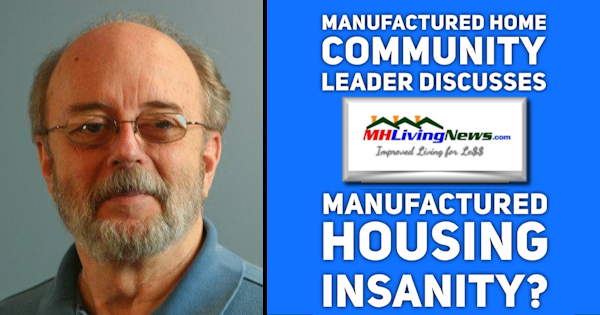


 manufacturedhomelivingnews.com Manufactured Home Living News
manufacturedhomelivingnews.com Manufactured Home Living News










































